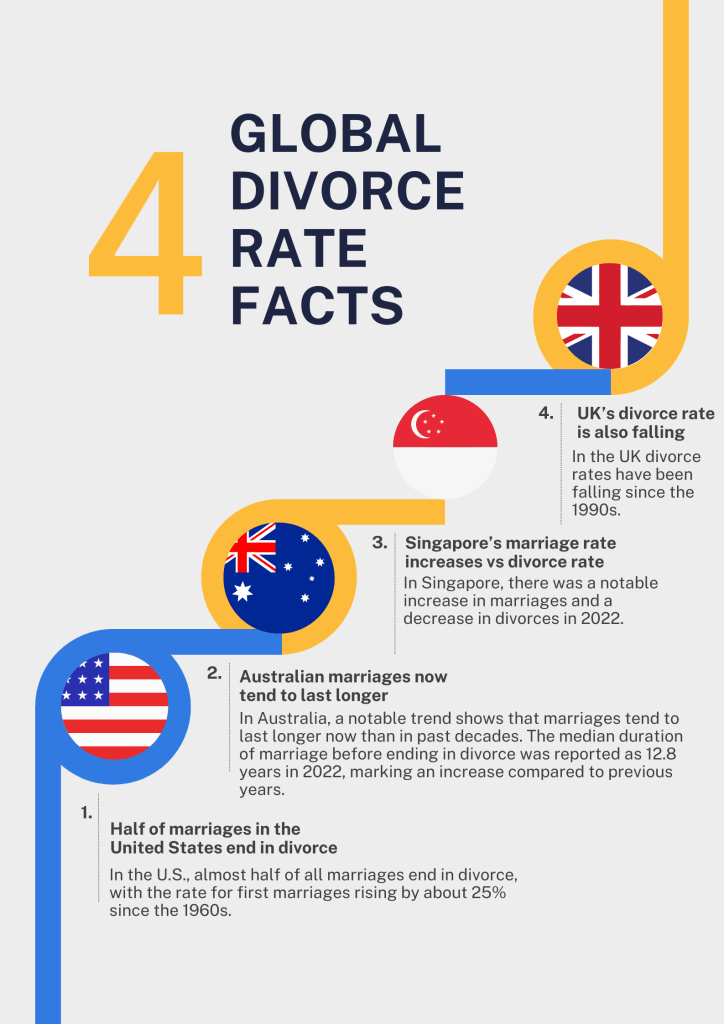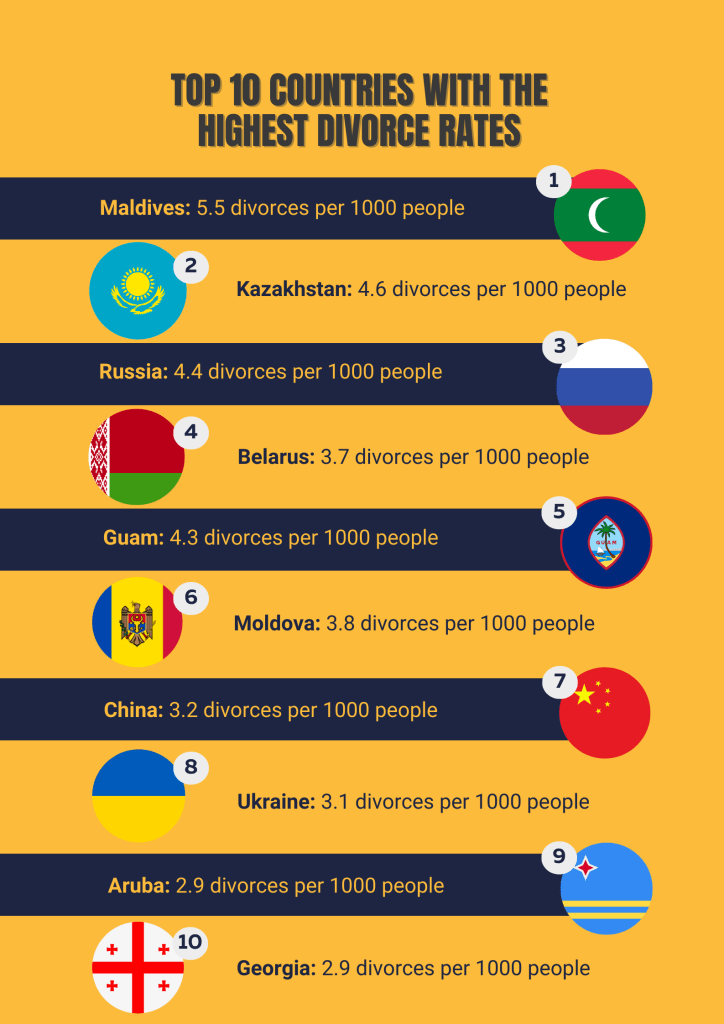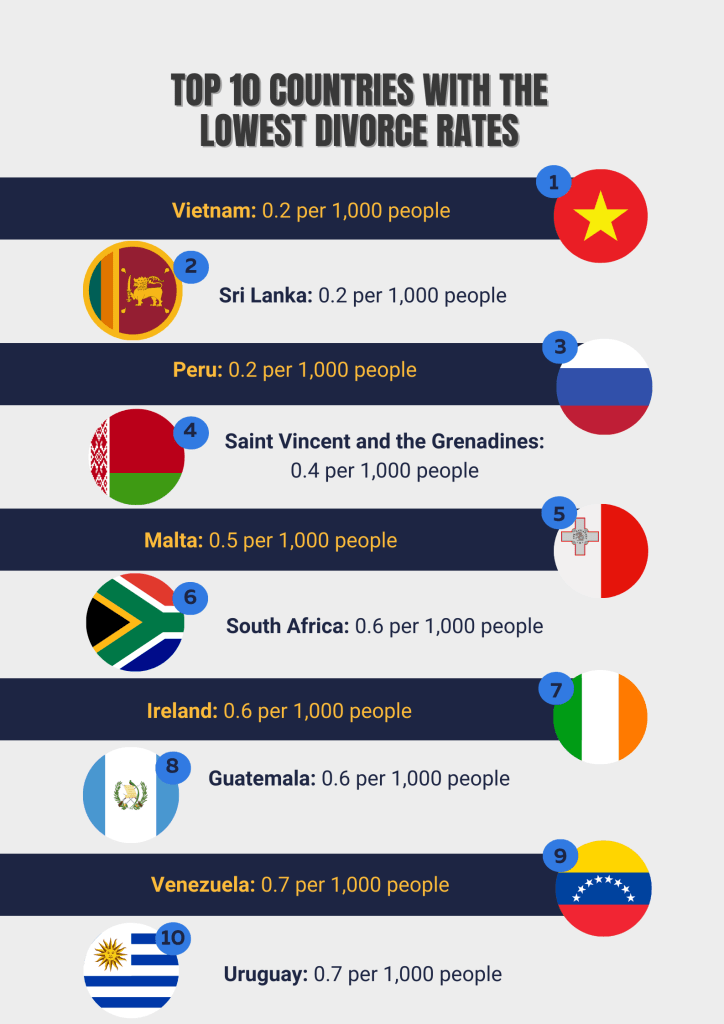Marriage is intended to be a lifelong commitment, but the reality is that many couples don’t reach the ‘happily ever after.’ Divorce rates shift across cultures and countries.
In this blog post, we’ll examine the countries with unexpectedly high and surprisingly low divorce rates in 2023 and explore the potential reasons behind these numbers.
Table of Contents
ToggleWhy Are Divorce Rates Rising Globally?
Divorce rates have been increasing steadily around the world in recent decades. Evidently, in the U.S., almost half of all marriages end in divorce, with the rate of first marriages rising by about 25% since the 1960s.
Similar trends exist in Europe and other regions. Even countries like China, Japan, and India, where divorce was once difficult or impossible, have seen their divorce rates significantly increase due to changing laws and social attitudes.
The average length of a marriage varies by location and demographic factors, but here are some insights based on recent data from different sources:
In the United States, the average marriage duration before ending in divorce is about 8.2 years. This duration reflects a broader trend where marriages have different outcomes based on various factors, including age and race.
The divorce rate in Australia shows that marriages tend to last longer now than in past decades. The median duration of marriage before ending in divorce was reported as 12.8 years in 2022, marking an increase compared to previous years
In the UK, divorce rates have been falling since the 1990s. The duration of marriages before their dissolution has been increasing, reflecting a broader global trend where the institution of marriage is evolving with societal changes
In Singapore, there was a notable increase in marriages and a decrease in divorces in 2022. The marriage rates for men and women in Singapore were among the highest in two decades, reflecting broader trends in marital behavior. The median age at first marriage also rose, indicating a trend towards later marriages. Conversely, divorce numbers decreased by 9.9% from the previous year, suggesting a strengthening of marital stability in the region during this period

Factors contributing to rising divorce rates:
- Changes in Legislation: Many countries have liberalised divorce laws, making it easier for couples to end their marriages.
- Shifting Cultural Norms: Divorce is becoming less stigmatised, leading more people to consider it a viable option when facing difficulties in marriage.
- Economic Stability: Financial independence makes separation more feasible in developed countries, especially for women.
- Individualism: There’s a stronger focus on personal fulfillment, leading some to prioritise their happiness, even if it means ending a marriage.
What Are The Top 10 Countries With The Highest Divorce Rates?
- Maldives: 5.5 divorces per 1000 people
- Kazakhstan: 4.6 divorces per 1000 people
- Russia: 4.4 divorces per 1000 people
- Belarus: 3.7 divorces per 1000 people
- Guam 4.3 divorces per 1000 people
- Moldova 3.8 divorces per 1000 people
- China: 3.2 divorces per 1000 people
- Ukraine: 3.1 divorces per 1000 people
- Aruba: 2.9 divorces per 1000 people
- Georgia 2.9 divorces per 1000 people

Why Does The Maldives Have Such A High Divorce Rate?
The Maldives, one of the smallest countries in terms of demographic size, holds the unfortunate distinction of having one of the highest divorce rates in the world.
Here’s a breakdown of the some possible reasons behind this:
Ease of Divorce for Men:
- Sharia Law: The Maldives is a predominantly Muslim country, and its legal system incorporates elements of Sharia law. In some Islamic traditions, a man can unilaterally terminate a marriage by simply uttering the word “talaq” three times.
- Limited Recourse for Women: Women have fewer options to initiate divorce and may face social and legal hurdles to do so. This imbalance creates an environment where men can end a marriage relatively easily.
Socio-Economic Factors:
- Remarriage: It’s socially acceptable and relatively easy for both men and women to remarry after a divorce. This lowers the perceived “cost” of divorce, potentially making it a more readily considered solution.
- Economic Independence: With an expanding tourism industry, the Maldives has seen improved economic opportunities for women. This financial independence can make it more feasible for them to leave unhappy marriages.
- Traditional Fishing Culture: Historically, men in the Maldives would often spend extended periods away from home for fishing. This could lead to distance and strain on marriages.
Changing Social Attitudes:
- Modernisation: As the Maldives becomes more exposed to Western ideas and global trends, traditional views on marriage and family may be shifting. There’s a potential trend towards prioritising personal happiness and fulfillment over preserving a marriage at all costs.
- Decreased Stigma: Divorce is becoming somewhat less stigmatised, making it a more socially accepted option when couples face difficulties.
Lack of Pre-Marriage Preparation:
- Young Marriages: The Maldives has a relatively young population. Marriages at younger ages can increase the risk of divorce.
- Inadequate Counseling: There may be less emphasis on pre-marital counseling or preparation, which could help couples develop stronger foundations and relationship skills before marriage.
Are divorce rates higher in developed countries?
Yes, divorce rates tend to be higher in developed countries. Factors contributing to this trend include greater financial independence, more liberal social attitudes toward divorce, and better access to legal resources for individuals seeking divorce.
In contrast, cultural, religious, and economic pressures in less developed countries can discourage divorce, even in unhappy marriages.
How did COVID-19 affect global divorce rates?
The COVID-19 pandemic had a significant impact on global divorce rates, although the effects varied by region and were influenced by multiple factors. Some countries reported an increase in divorce rates, which may be attributed to the stress and challenges couples faced during lockdowns, such as financial strain, increased domestic responsibilities, and constant proximity.
Conversely, in some regions, the pandemic caused a temporary decrease in divorce rates, likely due to the financial and logistical challenges of filing for divorce during lockdowns and court closures. Overall, the pandemic highlighted and sometimes exacerbated underlying issues in relationships.
Which country had the lowest divorce rate in 2023?
- Vietnam – 0.2 per 1000 people
- Sri Lanka – 0.2 per 1000 people
- Peru – 0.2 per 1000 people
- Saint Vincent and the Grenadines – 0.4 per 1000 people
- Malta – 0.5 per 1000 people
- South Africa – 0.6 per 1000 people
- Ireland – 0.6 per 1000 people
- Guatemala – 0.6 per 1000 people
- Venezuela – 0.7 per 1000 people
- Uruguay – 0.7 per 1000 people

Why does Vietnam have such a low divorce rate?
Vietnam maintains one of the lowest divorce rates in the world. Here are the major factors contributing to this:
Strong Cultural Emphasis on Family:
- Confucian Influence: Vietnamese culture is deeply rooted in Confucian values, which place a significant emphasis on family unity, stability, and respect for elders.
- Social Pressure: Divorce is often seen as undesirable and can bring shame or social pressure on the couple and their extended family.
- Filial Piety: There’s a strong expectation of children to prioritise the family’s well-being, which can include making sacrifices to preserve a marriage.
- Also read: Can You Divorce Your Parents in Australia?
Changing but Still Traditional Views:
- Modernisation: Vietnam is rapidly developing and views on marriage are gradually evolving. However, traditional values regarding the importance of marriage and family remain deeply ingrained.
- Economic Progress: As Vietnam’s economy improves, a greater sense of financial security may lessen marital strife for some couples.
- Stigma Remains: While less intense than in the past, divorce still carries a degree of social stigma, especially in rural areas, discouraging couples from seeking separation.
Practical Considerations:
- Cost and Division of Assets: Divorce proceedings can be expensive, and determining the division of assets can be complex. This may deter couples, especially those with limited financial resources.
- Concern for Children: Vietnamese parents often prioritise their children’s well-being, leading some to stay in unhappy marriages for the perceived stability it offers their children.
Limited Legal Access:
- Relatively Difficult Process: While divorce is becoming easier to obtain in Vietnam, the legal process can still be time-consuming and somewhat complicated, particularly if contested. This can discourage couples in conflict.
What are the common causes of divorce worldwide?
While specific causes can vary widely depending on cultural, social, economic, and personal circumstances, several common reasons for divorce are observed globally:
- Communication Issues: Poor communication or a lack of communication can lead to misunderstandings, resentment, and feelings of neglect among partners, contributing significantly to marital dissatisfaction and divorce.
- Infidelity: Extramarital affairs are one of the leading causes of divorce across many cultures. Trust is a fundamental component of any relationship, and infidelity severely undermines this trust, often beyond repair.
- Financial Problems: Money issues can place a significant strain on a marriage, whether due to differing spending habits, financial stress, or disagreements on financial priorities. Financial instability can lead to frequent arguments and a breakdown in the relationship.
- Lack of Commitment: When one or both partners are not fully committed to the marriage, it can lead to neglect, lack of effort in resolving conflicts, and eventually, separation or divorce.
- High Expectations: Unrealistic or unmet expectations about marriage or one’s partner can lead to disappointment and dissatisfaction, contributing to the decision to divorce.
- Incompatibility: People change over time, and sometimes couples find that they grow apart rather than together. Differences in values, interests, and priorities can lead to a sense of incompatibility and the realisation that they are better off apart.
- Domestic Violence: Unfortunately, abuse (whether physical, emotional, or sexual) is a significant cause of divorce worldwide. Victims may decide to leave the marriage to ensure their safety and well-being.
- Substance Abuse: Addiction issues, whether related to alcohol, drugs, or other substances, can have devastating effects on a relationship, leading to neglect, abuse, financial problems, and ultimately, divorce.
- Cultural and Religious Differences: In some cases, significant differences in cultural or religious backgrounds can create conflicts that are difficult to reconcile, influencing the decision to divorce.
- Health Issues: Chronic health problems can place a tremendous strain on a marriage, especially if one partner becomes more of a caregiver than a spouse, leading to burnout and resentment.
These causes can vary in impact and significance across different regions and cultures, but they represent some of the most common underlying factors contributing to divorce worldwide.
Are you in the middle of a divorce?
At Justice Family Lawyers, we understand how challenging this time can be. You’re not just a case to us; you’re seeking clarity and support through one of life’s toughest transitions.
Our dedicated team is here to guide you compassionately, offering tailored legal strategies that respect your circumstances. Let us be your advocates, helping you navigate the legal complexities to find a resolution that honors your well-being and future.
Your journey to a new beginning starts with understanding and respect. Reach out to our divorce lawyers today—where your story is heard, and your rights are protected.
Principal of Justice Family Lawyers, Hayder specialises in complex parenting and property family law matters. He is based in Sydney and holds a Bachelor of Law and Bachelor of Communications from UTS.







1 thought on “World’s Highest and Lowest Divorce Rates by Country”
Pingback: What Is A Divorce Order In Australia?